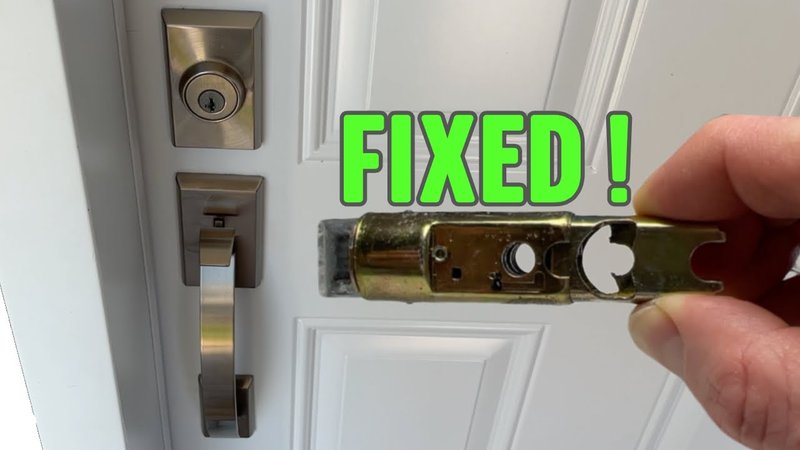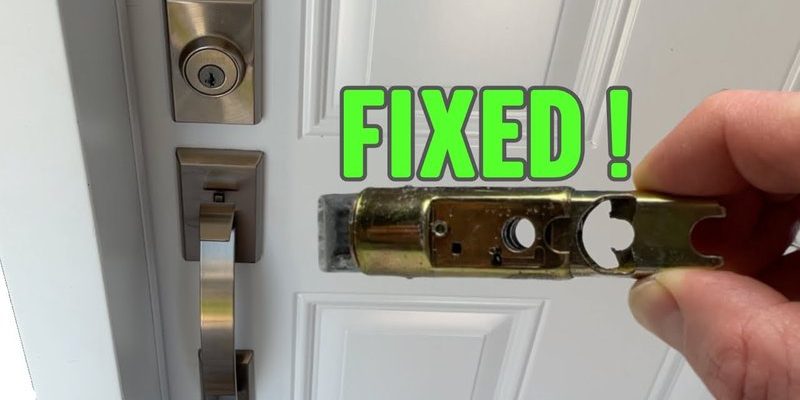
Honestly, a door latch isn’t something most of us think about until it starts making noise. But when it does, it can be as distracting as someone dropping a stack of plates in the kitchen. You might wonder if it means something is broken, if your remote keypad is syncing right, or even if it’s a sign you’ll need a whole new lock. Before you spring for a fix—or stick a towel in the door to muffle it—let’s take a closer look at what’s really going on with your noisy handleset latch.
What Causes Handleset Latches To Make Noise?
Here’s the thing—when a handleset latch makes a loud noise, it’s usually the result of several small issues stacking up. The most common cause is friction between the latchbolt and the strike plate (that metal piece in the door frame). If the alignment is even slightly off, or if things aren’t lubricated well, every time you close the door, the latch hits the strike plate with a bang instead of sliding in smoothly.
Sometimes, it’s all about the parts inside the latch itself. Over time, springs might wear out or metal bits inside may grind together, especially if your handleset (like a smart keypad model) gets a lot of use. Maybe the latch needs a sync or reset if it’s electronic, but most of the time, it’s just mechanical wear and tear.
Let me explain—think about how often you open and close your front door. All those tiny impacts add up! If dirt or debris gets stuck in the latch, or if the handle’s mounting screws loosen, that can also make things louder than they should be. It’s a bit like a bike chain that needs oil—until you fix it, it keeps making a racket.
Common Signs Your Loud Handleset Latch Needs Attention
A sudden increase in noise isn’t just annoying—it’s the lock’s way of getting your attention. Here are some signs it’s time to look closer:
- Repeated slamming or clacking every time you shut the door, even gently.
- Louder sounds during cold or hot weather, when temperatures change how the door fits.
- Difficulty locking or unlocking with your remote or keypad, especially if the latch doesn’t retract all the way.
- Vibration or rattling after the door closes, almost as if something inside is loose.
You might be wondering, “Does this mean my handleset is about to break?” Not necessarily. Sometimes all it takes is a little maintenance, but ignoring it can make things worse. If you’re using a universal remote entry system, that noise could mean the latch isn’t syncing right with the strike plate, which might eventually jam the lock. Honestly, dealing with it early is always better.
How Misalignment Makes Latches Noisy
One of the main reasons for a loud handleset latch is misalignment. Over time, doors settle, hinges sag, or even slight warping can throw things off by a millimeter or two. That’s enough to turn a quiet click into a full-on clunk.
When the latchbolt doesn’t glide smoothly into the strike plate, it catches on the edge and makes noise. Sometimes, the strike plate itself shifts if the screws loosen or the doorframe swells (humidity is sneaky like that). If you’ve recently changed the battery in a smart handleset or installed a new brand of remote, the process might have nudged things out of place.
Here’s a relatable example—a neighbor swapped out his keypad handleset last year, thinking it’d be a quick upgrade. The noise after installation was deafening. Turns out, just a 1/8″ misalignment was causing the latch to hit metal on every close. After adjusting the strike plate, the problem was gone. So, even if your handleset is top-of-the-line, alignment matters.
Why Lubrication Makes Such a Big Difference
If your handleset latch sounds like it’s squealing, grinding, or even just “thunking” too loudly, lack of lubrication is often the culprit. All the little moving parts inside the latch—plus the contact point with the strike plate—need to move smoothly. When things dry out, every motion is amplified. It’s a bit like running a car without oil; it works, but it’s not happy about it.
You don’t need anything fancy—just a small spritz of graphite or silicone spray can do wonders. WD-40 is popular, but honestly, it can attract dust over time, so if you want to keep things running quietly, try a product meant for locks. If you’re unsure, check your handleset brand’s care guide—they often spell out what’s safe.
“A silent latch is usually a well-oiled latch. A noisy one is asking for a little TLC.”
Taking five minutes to lube the latch and strike plate can cut the noise in half, if not more. If you’ve got a battery-powered remote lock—especially one like a Kwikset or Schlage—lubrication can also help the motor retract and extend the latch smoothly, reducing both sound and future wear.
Loose Hardware: The Silent (Or Not-So-Silent) Culprit
Loose screws inside the handle or at the strike plate can make the entire locking mechanism rattle. Over time, even the best handleset will start to shake itself loose, especially if it’s used dozens of times a day. Think of it like a wobbly table—doesn’t matter how expensive it is, if the bolts aren’t tight, it’ll make noise.
Sometimes, the handle itself shifts enough that you feel it wiggle before you hear the noise. Other times, you only notice the clattering after the door’s closed. If you have a universal remote or keypad entry system, loose internal connections can even interrupt code syncing or sensor pairings, adding electronic “beeps” to the mechanical racket.
Grab a screwdriver and check everything—handle, strike plate, latch mechanism, keypad faceplate. Tighten up every screw you see, but don’t overdo it. If you find stripped screws, consider replacing them or using longer ones for a tighter fit. A quick reset or re-sync of your electronic handleset after re-tightening can also help.
Weather, Dirt, and Everyday Wear
Let’s talk about the less obvious—weather and dirt. Doors swell in the summer and shrink in winter, which can subtly shift how the latch meets the strike plate. If you’ve ever noticed your lock getting stickier or noisier during certain seasons, this is probably why.
Then there’s the dirt issue. If you live somewhere dusty, or even just have kids and pets, small debris can work its way into the latch mechanism. Over time, this makes every motion less smooth and increases friction—a direct cause of that loud, harsh sound.
Honestly, a quick cleaning a few times a year can make a huge difference. Use a soft brush or canned air to clear out the latch opening. If you’ve got a battery-powered remote, pop the cover and check for dust around the connections too. Routine cleaning isn’t glamorous, but it definitely helps your handleset latch stay quiet and responsive.
When To Repair or Replace Your Handleset Latch
So when is it time to stop troubleshooting and actually swap out your handleset latch? If you’ve tried everything—lubrication, tightening screws, realigning the strike plate, cleaning—and the noise still won’t quit, that’s a sign the internal parts are worn out.
Springs inside the latch mechanism can weaken after years of use. Sometimes, the metal gets bent or pitted, especially if someone’s been a little too rough on the handle. For electronic models, you might notice trouble pairing or syncing the keypad with the latch, or the battery draining quickly as the motor works overtime.
Here are a few signs replacement is the best move:
- The latch sticks or jams regularly, no matter how much you clean or lubricate it.
- The handle or keypad doesn’t stay tight, even after re-securing the hardware.
- You hear grinding, squealing, or clicking inside the mechanism when turning the handle or entering your code.
If your handleset is under warranty (many brands offer long guarantees), call the company before buying a replacement. Universal models can sometimes be swapped in, but always double-check compatibility. You deserve a lock that’s safe, quiet, and easy to use—no annoying noises required.
Comparing Handleset Types: Universal vs Brand-Specific Latches
You might be wondering if changing to a universal handleset latch could help. Universal latches are meant to fit many door types and brands, offering flexibility if you’re replacing a discontinued model. Brand-specific latches—like those from Schlage, Kwikset, or Yale—are precision-built for their matching hardware and often give a smoother, quieter action straight out of the box.
Here’s a quick comparison:
| Universal Latch | Brand-Specific Latch |
|
|
Bottom line: If noise and smoothness matter most, sticking with your handleset’s original brand is often the best bet. If you need flexibility, universal options can work, but take the time to check alignment and pair the hardware carefully.
Realistic Fixes: Quiet Down a Loud Handleset Latch
Here’s a simple checklist to quiet down your handleset latch—no matter the brand or remote features:
- Lubricate all moving parts, including the latchbolt and strike plate.
- Tighten every screw on the handle and strike plate.
- Check alignment by slowly closing the door and watching the latch enter the strike plate.
- Clean away dust and debris from the latch and keypad area.
- Reset or re-sync any electronic entry system after making changes.
If the noise is still there, don’t feel bad—sometimes replacement is just the smartest move. Handleset hardware is tough, but it’s not meant to last forever. Giving your door a tune-up every year or two keeps the annoying sounds to a minimum.
Closing Thoughts: Living With (or Without) a Noisy Handleset Latch
At the end of the day, a loud handleset latch isn’t something you have to live with forever. Most of the time, it’s a fixable annoyance—a little like squeaky shoes or a rattling vent. Sometimes, all you need is a screwdriver and a can of spray. Other times, it’s a sign to treat yourself to a new lock and enjoy the quiet click of a well-fitted latch.
Remember, your door is one of the most-used things in your home. Keeping it in good shape keeps your space peaceful, secure, and, honestly, a little bit less stressful every time you come and go. So the next time you hear that loud clack, you’ll know exactly what to do—and you won’t have to cringe about it ever again.
